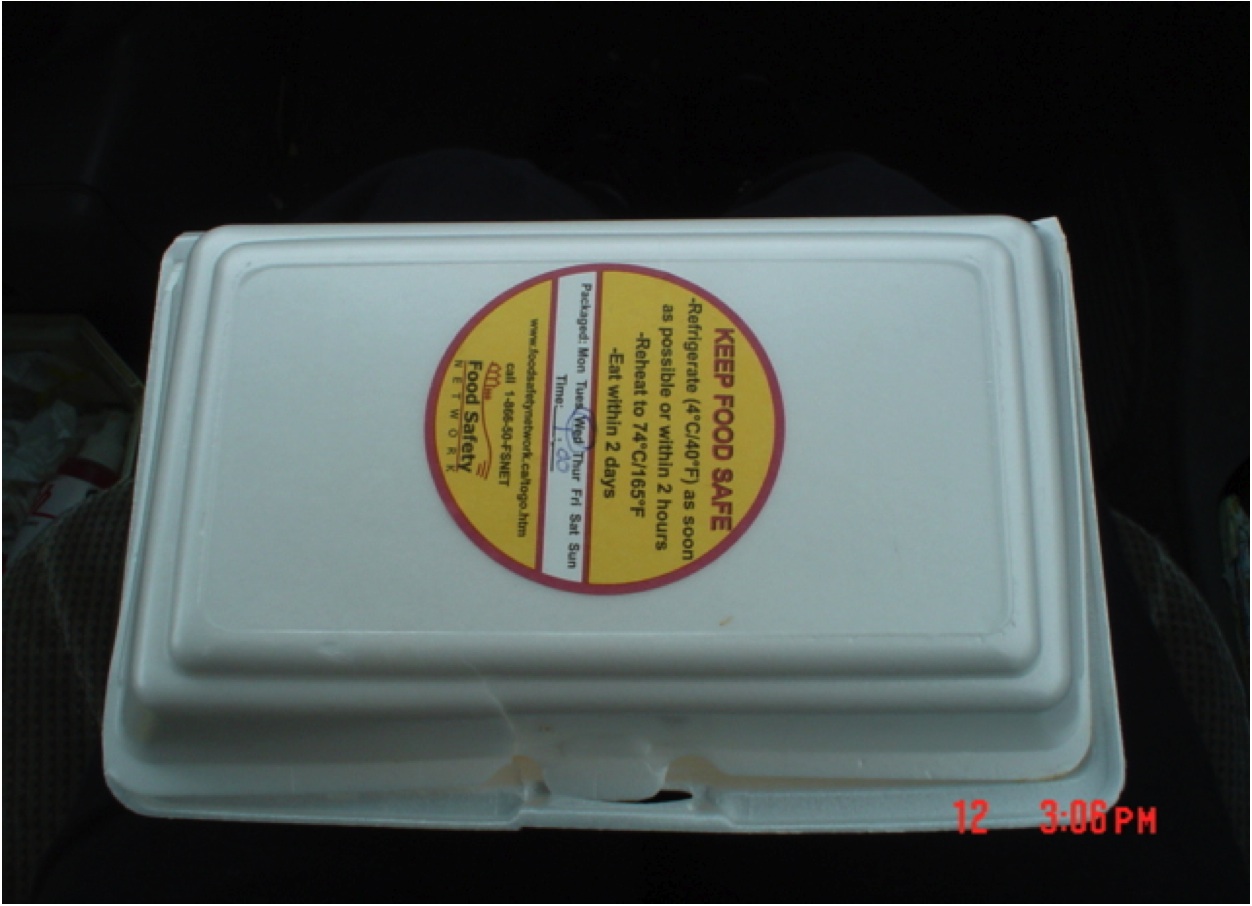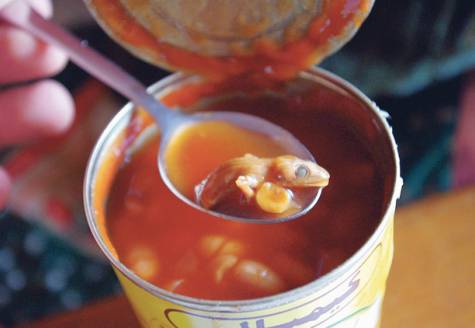Food such as takeout or takeaway, that is initially prepared in a restaurant but is consumed in an individual’s home, may be a venue to target with safe-food handling messages. Earlier this decade, both Chicago-based Francesca Restaurants and Boston-based Buca Di Beppo Restaurants reported anecdotal success placing food safety labels on containers of takeout food.
 In 2004, my group undertook research to:
In 2004, my group undertook research to:
• examine restaurant managements’ experience of using a safe food-handling label on takeout food;
• explore managements’ food safety concerns;
• determine the value of consumer safe-food handling labels to managers;
• establish perceived label effectiveness; and,
• identify challenges with implementation.
For our study, we defined take-out as food procured from a casual dining restaurant (i.e. sit-down restaurant) but eaten elsewhere, including food ordered as take-out and leftover food packaged to be taken home. The label we developed is right (above) and left (note, the phone line and web site don’t work anymore).
The research paper describing that work has been accepted by a peer-reviewed scientific journal and will be published in the near future.
However, the public health types in Dubai discovered over the weekend the same thing we found: most consumers and restaurateurs like the idea.
 Our bites.ksu.edu Dubai correspondent contacted Ben and me about stickers on takeaway, and we sent along what we had developed. Today, the Khaleej Times reports,
Our bites.ksu.edu Dubai correspondent contacted Ben and me about stickers on takeaway, and we sent along what we had developed. Today, the Khaleej Times reports,
The Dubai Municipality is planning to encourage all restaurants in the emirate to issue advisories to consumers on safe handling of takeaway food.
The decision follows a similar initiative by a popular south Indian restaurant group that attaches red stickers to its takeaway bags at its two outlets in Dubai. A municipality official applauded the group’s move and said the civic body intended to support such initiatives by other restaurants as well.
Director of Food Control Department, Khalid Mohammed Sherif, told the Khaleej Times,
“We are encouraging more and more food outlets to put such messages along with takeaway food to ensure that the customer handles the food properly. We will be providing all of them with modified instructions for customers to handle food taken away.”
He said the modified versions of the advisories will include the temperature at which food items have to be stored and the duration within which they have to be consumed, depending on the types of ingredients.
Below is a draft of the information intended for consumers.

 the spoon. It was half a lizard. I was lucky enough that it was right on top of the can. I was going to eat half the can only. I can only imagine if it was at the bottom of the can."
the spoon. It was half a lizard. I was lucky enough that it was right on top of the can. I was going to eat half the can only. I can only imagine if it was at the bottom of the can."
 Ahmed AbdulRahman al Ali, the head of the municipality’s food inspection section, said the offenders were also slapped with a fine of more than Dh30,000, adding,
Ahmed AbdulRahman al Ali, the head of the municipality’s food inspection section, said the offenders were also slapped with a fine of more than Dh30,000, adding,.jpg) In Dubai, more than 60 per cent of food workers in the capital who took hygiene training courses last year failed them
In Dubai, more than 60 per cent of food workers in the capital who took hygiene training courses last year failed them Canadian beer, smoke cigars and compete in would-be drunk Zamboni driving contests.
Canadian beer, smoke cigars and compete in would-be drunk Zamboni driving contests. Steve Keough, a spokesman for the Canadian Olympic Committee, said the COC had not provided the alcohol nor initiated the party, adding,
Steve Keough, a spokesman for the Canadian Olympic Committee, said the COC had not provided the alcohol nor initiated the party, adding, In 2004, my group undertook research to:
In 2004, my group undertook research to: Our
Our 

 Another outlet, Calicut Paragon in Karama, invested their resources in stickers for take-out bags that advise consumers to eat their food within two hours of purchase—a step that suggests a shared responsibility for the safety of food and that I find a little more palatable.
Another outlet, Calicut Paragon in Karama, invested their resources in stickers for take-out bags that advise consumers to eat their food within two hours of purchase—a step that suggests a shared responsibility for the safety of food and that I find a little more palatable. .jpg) Over the past 12 months, inspectors checked 1,588 restaurants and cafeterias, of which only 223 met the minimum requirements, according to Jassim Mohammed al Ali, head of the municipality’s internal inspection department.
Over the past 12 months, inspectors checked 1,588 restaurants and cafeterias, of which only 223 met the minimum requirements, according to Jassim Mohammed al Ali, head of the municipality’s internal inspection department..jpg) “We just want to make sure that we serve the best quality food and the safest. And so if it’s rare, obviously there are factors that will contribute to how safe the food is.”
“We just want to make sure that we serve the best quality food and the safest. And so if it’s rare, obviously there are factors that will contribute to how safe the food is.”.jpg)